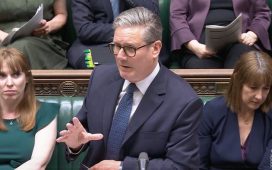Campaigners have called on the UK government to freeze household energy costs beyond the end of March as falling wholesale prices sharply reduce the amount of government subsidy needed to hold bills steady.
The average UK household bill is set to rise to £3,000 per annum between April and June under the UK’s energy price guarantee (EPG) scheme, up from £2,500 today, as chancellor Jeremy Hunt has argued that the government cannot afford to keep subsidising bills at the lower level.
Households face even steeper increases as the government’s energy bill support scheme, which shaved an additional £400 off every household payment, is set to end.
But the latest forecasts for UK household energy costs show the regulator’s price cap — which sets the unsubsidised price of energy for the majority of homes — will not rise as much as previously feared, reaching around £3,300 in April and dropping below £2,200 from June.
Late last year it was predicted that it would rise well above £4,000 as energy prices soared.
Cornwall Insight, a consultancy, estimated on Monday that the additional cost to the government of freezing bills at £2,500 between April and June would be £2.6bn, or less than 10 per cent of the total cost of the EPG that has been in place since October.
“The greater the disparity between the cost of the two schemes the higher the governmental expense,” Cornwall Insight said.
“If the EPG were to increase to £3,000 as planned, the estimated cost [to the government] would be £26.8bn while if it were to remain at £2,500, the estimated cost would be £29.4bn.”
Investec, the investment bank, said on Monday that its “final” forecast for the price cap in the April to June period was £3,332, while Cornwall Insight forecast £3,294.
Both have a strong record of accurately predicting the cap and see it falling to below £2,200 in June — freeing the government from subsidies for the average household entirely — as a slide in wholesale gas prices of almost 65 per cent since early December starts to feed through.
The official price cap announcement from regulator Ofgem is due on February 27.
Ed Davey, leader of the Liberal Democrats, said the Conservative party would demonstrate it was “out of touch” if it let bills rise as households struggle with the cost of living crisis.
“It would be irresponsible and deeply unfair for the government to increase people’s energy bills now,” Davey said.
Simon Francis of the End Fuel Poverty Coalition said the government should have additional funds available, with wholesale gas prices falling by almost 80 per cent since their peak in August and 65 per cent since early December.
“The government has not had to spend as much as they thought they were going to,” Francis said. “The money is presumably still there and they should be able to help people even further.”
Before the energy crisis, the average household bill for homes with normal gas and electricity usage was generally around £1,200 under the regulator’s price cap, before Russia restricted gas supplies to Europe.
HM Treasury has so far been cautious on the prospect of extending additional support to keep average bills at £2,500, warning that the government would be on the hook if wholesale prices were to quickly rebound.
“Prices are volatile and can increase as fast as they fall,” a Treasury spokesperson said. “If prices return to their late-August level, the government would need to borrow an extra £42bn and potentially increase taxes.”
Officials added proceeds from the windfall tax on energy companies were also likely to undershoot earlier predictions given the fall in wholesale prices, offsetting some of the benefit to the government.
“It would be irresponsible to plan fiscal policy on such volatile prices,” one official said.
Meanwhile, the government has appointed Alison Rose, chief executive of banking group NatWest, to co-chair its Energy Efficiency Taskforce, set up recently to cut Britain’s power consumption.
The task force will aim to accelerate boiler upgrades, household insulation and business efficiency measures to try to cut the country’s energy use by 15 per cent within seven years.
The appointment will be confirmed by Hunt on Tuesday at a meeting with nearly 100 representatives of UK-based green companies. Lord Callanan, a junior business minister, will be the other co-chair.
Climate Capital

Where climate change meets business, markets and politics. Explore the FT’s coverage here.
Are you curious about the FT’s environmental sustainability commitments? Find out more about our science-based targets here










